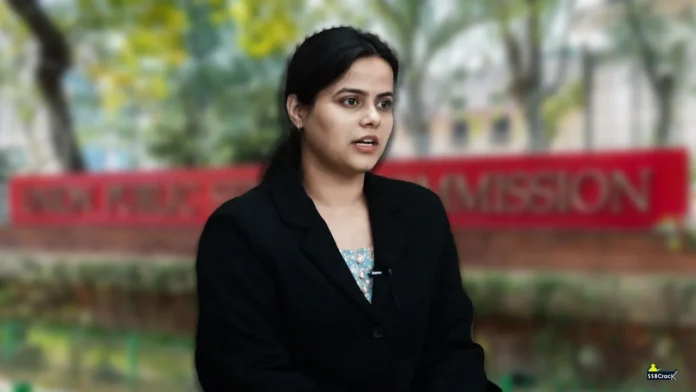“Shakti Dubey IAS” is not just a name on the top of the UPSC Civil Services 2024 result list — it’s a symbol of perseverance, grit, and the triumph of humble beginnings. Her journey from the modest streets of Prayagraj to becoming the All India Rank 1 UPSC topper is a story that deserves to be told — and retold — as a source of inspiration for every aspirant in the country.
Background: Who is Shakti Dubey IAS?
Born and raised in Prayagraj, Uttar Pradesh, Shakti Dubey is the daughter of a Sub-Inspector in the Uttar Pradesh Police. She belongs to a middle-class family where discipline and integrity were values practiced more than preached. Her father’s life in the police service taught her early lessons in duty, resilience, and public service.
Growing up, there were no elite coaching centers or expensive resources at her disposal. What she had was something much more powerful — an unyielding will to serve the nation and change lives.
The Struggles Before Success: A Story of Resilience
The title “Shakti Dubey IAS” was not earned overnight.
This was her fifth attempt at cracking the UPSC Civil Services Examination — an exam known not just for its toughness, but for testing every fiber of a candidate’s emotional and intellectual resilience.
For four years, she faced rejection, disappointment, and emotional turmoil. But instead of giving up, Shakti chose to transform every setback into a setup for a comeback.
Her Strategy: Biochemistry, Newspaper Reading & Answer Writing
Unlike most toppers who choose more conventional optional subjects like PSIR or Sociology, Shakti Dubey chose Biochemistry — a highly technical subject — and mastered it with precision.
Her daily schedule included:
- Reading The Hindu and Indian Express religiously
- Practicing answer writing for both GS and Essay papers
- Mock tests and peer evaluations
- Staying consistent, even when motivation faded
One of her favorite self-written affirmations was:
“UPSC tests your preparation, but more than that, it tests your patience.”
UPSC CSE 2024 Result: Shakti Dubey Secures AIR 1
On April 22, 2025, the UPSC Civil Services Final Result 2024 was declared.
And there it was:
All India Rank 1: Shakti Dubey – Roll Number 240782
The news spread like wildfire. The media, coaching institutes, mentors, and aspirants across the country began searching:
“Who is Shakti Dubey IAS?”
Overnight, her journey became a national headline — not because she topped the exam, but because she did it against all odds, with authenticity, humility, and relentless consistency.
What Shakti Dubey IAS Said After the Result
When asked what kept her going despite four failed attempts, Shakti Dubey IAS replied:
“This rank isn’t just mine. It belongs to every girl who is told her dreams are too big. If I can do it, you can too. UPSC rewards consistency, not perfection.”
She also emphasized the importance of self-study, reading newspapers daily, and not comparing your journey to others.
Shakti Dubey’s Vision as an IAS Officer
Shakti has expressed a strong interest in working for:
- Rural education reform
- Healthcare access for marginalized communities
- Women’s empowerment and safety
Her goal isn’t just to be an officer but to be a transformational leader. She believes bureaucracy should be accessible, empathetic, and rooted in ground realities.
Lessons from Shakti Dubey IAS for UPSC Aspirants
Here’s what every UPSC aspirant can learn from her journey:
1. Failure is feedback, not defeat
Shakti didn’t let four failed attempts define her. Instead, she used each one to fine-tune her strategy.
2. Optional subject doesn’t matter as much as mastery
Despite Biochemistry being rare, she made it her strength.
3. Mindset is everything
The way you think about your journey impacts how far you’ll go. Shakti’s mental strength was her biggest weapon.
Why “Shakti Dubey IAS” is Trending
In just days after the result, “Shakti Dubey IAS” became one of the most searched keywords related to UPSC in India. Her name is now associated with:
- Rank 1 UPSC 2024
- Inspirational success stories
- UPSC preparation without coaching
- UPSC Biochemistry optional strategy
Final Words: The Legacy Begins
Shakti Dubey IAS is not just a topper. She’s a torchbearer for every student from a small town with a big dream. Her story proves once again:
“The size of your dreams should always exceed the size of your obstacles.”
As she begins her training at LBSNAA and prepares for real-world governance challenges, one thing is certain — India has found not just a brilliant officer, but a deeply grounded one.


